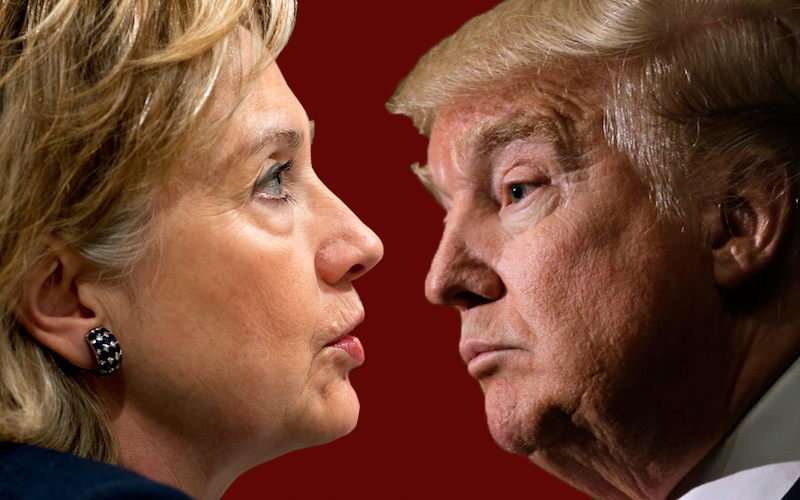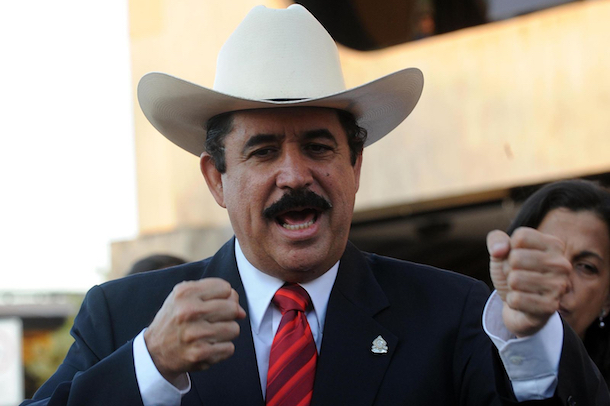
How Would Clinton and Trump Impact Latin America?
U.S. foreign policy has been disastrous for many in Latin America. In living memory, the U.S. has both openly and covertly supported regimes and groups that have committed humanitarian atrocities and undermined democracy. Though U.S. policy and trade deals have arguably helped boost the region’s economies, it is difficult to look past the recent history of U.S.-sponsored violence in Latin America. With the first of the U.S. presidential debates now over, it is high time to assess what implications a Clinton or Trump presidency could have for Latin America.
It is a lot easier to speculate how Hilary Clinton would approach relations with Latin America. As a former Secretary of State, she has far more foreign policy experience on which she can be judged than the businessman Donald Trump. She is also, frankly, a lot more articulate about actual policies than her rival. Having said this, Clinton has remained quiet on the subject of Latin America.
This is unsurprising considering the focus of the global media on the ongoing crises in the Middle East, an area about which both candidates have been extremely vocal. Since the end of the Cold War, U.S. policy seems to have shifted away from its “back yard” and since 9/11 has been largely preoccupied with the War on Terror.
Although Latin American foreign policy is no longer a primary concern of the U.S., it still deserves to be thoroughly considered and conveyed to the public by the presidential candidates. This is partly because of the aforementioned history of interventionism in the region and the significant number of Latino U.S. citizens to which the candidates are trying desperately to appeal. However, the Candidates also need to address an important and deeply consequential regional dynamic- the ongoing antagonism between the U.S. and Latin America’s Socialist states (Bolivia, Ecuador, Venezuela, and Cuba).
Despite keeping quiet on the subject of Latin America in this election, Clinton has had personal involvement “south of the border.” In her 2014 book Hard Choices Clinton outlined how in the immediate aftermath of the 2009 coup in Honduras which ousted the left-leaning President Manuel Zelaya, she had strategized with her regional counterparts to ensure a swift general election- a return to democracy.
Clinton admits however that this election was never meant to include the existing democratically elected leader, the progressive former President Zelaya. Furthermore, this election was not monitored by any international body, and was prefaced by multiple assassinations of anti-coup spokespersons, and has since been followed by years of government repression and a dramatic rise in violent crime.

Clinton’s participation in Honduras helped legitimize an anti-democratic coup against an ambitious social reformer, a story that is all too familiar in Latin America’s bloody history.
Though the Obama administration pledged to find a new way forward with Latin America, this has arguably not been achieved. Instead, token gestures such as the U.S.-Cuban diplomatic thaw and John Kerry stating that the “era of the Monroe Doctrine was over” may well have distracted from a continuation in the policy. Obama failed to implement any sanctions against Honduras after the coup despite governmental repression, yet has repeatedly implemented sanctions against leftist Venezuela for comparable reasons.
Furthermore, both Edward Snowden’s and WikiLeaks’ disclosures have revealed a concerning habit of U.S. spying in Latin America, with Dilma Rousseff’s former Worker’s Party government in Brazil being the most heavily monitored in the region. It seems extremely unlikely that a Clinton presidency would break from the precedents she helped fortify as Secretary of State.
Clinton would however diverge from the Obama administration over immigration. Deportation levels of undocumented Latin Americans have risen sharply under Obama, and despite previously having supported deportation and tougher immigration policies in the past, Clinton has pledged to not deport any undocumented immigrants (except violent criminals and terrorists). This however appears to be the only significant break with the status quo.
Clinton, if she is to be judged by her track record, would continue this two-faced Latin American foreign policy; advocating reconciliation, democracy, and human rights, whilst trying to influence and manipulate the direction that Latin America’s nations take.
Whereas Clinton’s policies would largely represent continuation, Trump could drastically change the regional dynamic through a radical break in policy.
Trump was previously the only Republican presidential candidate to openly (though somewhat apathetically) support the U.S.-Cuban thaw. He has since gone back on this and claims that in office he would immediately reverse any deal made between the current president and Cuba. Even if this diplomatic thaw is largely symbolic, to reverse what progress has been made for the sake of “a better deal” for the U.S. would undoubtedly damage relations in the region.
Trump’s proposed immigration policies have proved incendiary (such as banning all Muslims from entering the U.S.) and many have been targeted specifically at Latin Americans. Trump’s proposed border wall, his promise to abolish Birthright Citizenship for the children of undocumented immigrants, and his opposition to the Cuban Adjustment Act could significantly impact the trend of Latin American economic migration to the U.S. It is abundantly clear that Latin American migrant workers in the U.S. have greatly benefited the economy, yet regardless, a great many U.S. citizens favor less immigration. Trump’s policies would not only directly affect the U.S. economy, but also the livelihoods of millions of Latino workers and their families.
Furthermore, Trump is strongly opposed to two free trade agreements, NAFTA and the TPP. This stance, and his desire to exit such agreements, would have serious implications for the region. These commercial accords are divisive, having been both praised and derided throughout Latin America for their effects on working people.
To use the example of 1994’s NAFTA, Trump has said that this allowed Mexico to “beat” America commercially, as major U.S. industries moved to Mexico where workers accepted lower wages. However, NAFTA also arguably undermined Mexico’s agricultural industries, as the agreement meant that some staple crops such as corn could now be imported from the U.S. at a cheaper rate than could be offered domestically
What is nearly universally recognized about these free trade agreements is that they help entrench the neoliberal economic model in Latin America. Trump’s opposition to these commercial agreements (which have long been lampooned by the Latin American Left as imperialist and anti-democratic) could partly explain why Ecuadorian President Rafael Correa said recently that a Trump presidency would reinvigorate the region.
Comparing Trump to former President George W. Bush, Correa said that Bush’s right-wing policies had helped consolidate the Latin American left. He speculated that a Trump presidency might have similar results. Though he stated that a Trump presidency would be better for Latin America, he admitted that he hopes Clinton wins for the sake of “the world in general.”
However, perhaps Correa is too hasty in presuming that a Trump presidency would be beneficial for the region.
Trump appears opportunistic, indecisive, and irrational. As a prospective leader of the region’s dominant superpower, this is not encouraging. Regardless of whether Clinton’s foreign policy in the region would be constructive or not, it is at least fairly predictable- more of the same. The same cannot be said of Trump. The number of times this candidate has contradicted himself and stood by his spontaneous, ill-conceived ideas reveals a sporadic and worrying sense of judgment.
If this unpredictability is not enough to make Correa reconsider, then he should also take into account the nationalistic overtones of Trump’s stated intentions.
Trump’s declaration to ensure that his foreign policy puts American interests and security “above all else” evokes a hawkish stance that seems at odds with his otherwise isolationist policies. Recent U.S. interventionism in the region has left deep scars in the name of protecting national interests and security. For example, Reagan’s involvement in Nicaragua, El Salvador, and Guatemala were justified by protecting American interests and ensuring security from the threat of Latin American Socialism. This is not to say that Trump is simply shaping up to be a second Reagan (though let’s not forget that Trump’s campaign slogan “Make America Great Again” is clearly designed to evoke Reagan’s 1980 slogan “Let’s Make America Great Again”). However, Trump’s nationalistic rhetoric is cause for concern, and should send the alarm bells of recent history ringing.
Unless a dramatic political situation develops in Latin America over the next two months, the candidates are unlikely to outline in any great detail how they intend to manage their relations with the region. We can only hope that they learn from the mistakes of their predecessors and do not follow an interventionist path that undoes democracy for the sake of U.S. interests. The next president should work with the states of Latin America to advance regional democracy and development, but not at the cost of violating sovereignty and human rights.
